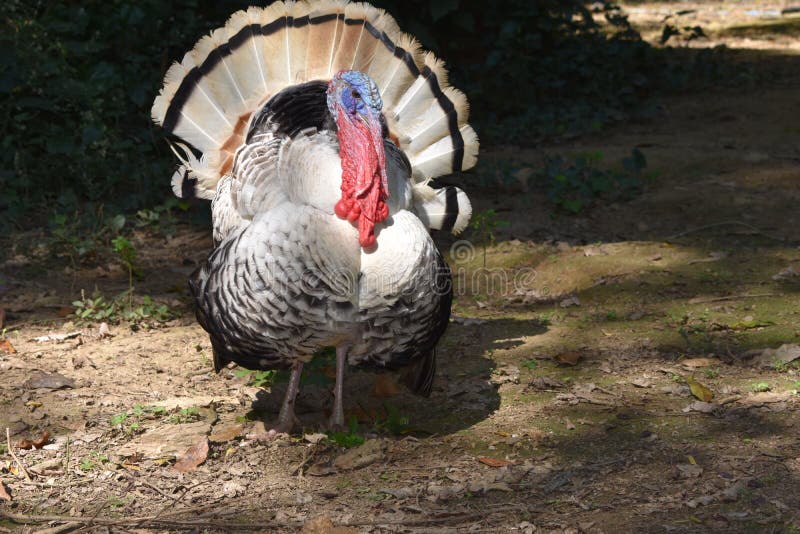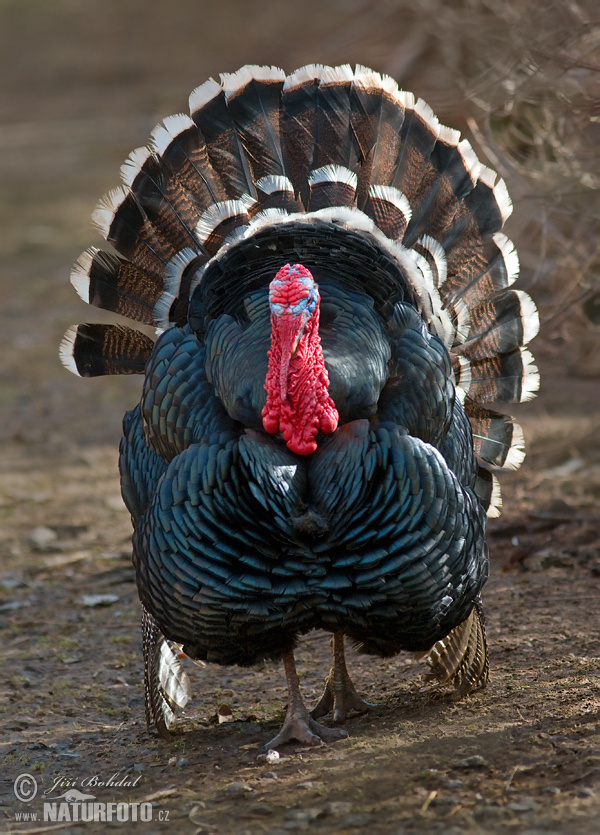Domesticated turkey has become an integral part of many cultures around the world, particularly in the United States where it plays a central role in Thanksgiving celebrations. This bird, originally native to North America, has undergone a remarkable transformation from its wild origins to the domesticated form we know today. Understanding its history, characteristics, and importance provides valuable insights into its significance in agriculture and culinary traditions.
As one of the most consumed poultry in the world, domesticated turkey offers a rich source of protein and nutrients, making it a staple in many households. Its domestication dates back centuries, with evidence suggesting that early civilizations in Mesoamerica were among the first to domesticate this bird.
This article delves into the fascinating world of domesticated turkey, exploring its origins, characteristics, breeding practices, and its role in modern agriculture. Whether you're a poultry enthusiast, a history lover, or simply curious about this bird, this article provides comprehensive insights into all things related to domesticated turkey.
Read also:Evidence In Jodi Arias Case A Comprehensive Analysis
Table of Contents
- History of Domesticated Turkey
- Characteristics of Domesticated Turkey
- Breeding and Raising Domesticated Turkey
- Nutritional Value of Turkey Meat
- Culinary Uses of Turkey
- Economic Importance of Domesticated Turkey
- Conservation and Sustainability
- Genetics and Scientific Research
- Cultural Significance of Domesticated Turkey
- Future of Domesticated Turkey
History of Domesticated Turkey
The domestication of turkey traces its roots back to ancient civilizations in what is now modern-day Mexico. Archaeological evidence suggests that the Aztecs and Mayans were the first to domesticate this bird around 800 BCE. These early civilizations valued domesticated turkey not only as a source of food but also for its feathers, which were used in ceremonial clothing and decorations.
Domestication Process
The domestication process of turkey involved selective breeding for traits such as size, temperament, and meat quality. Over time, these efforts led to the development of breeds that were more suited for human consumption. The spread of domesticated turkey across continents began with the arrival of European explorers in the Americas, who brought the bird back to Europe in the 16th century.
Today, domesticated turkey is found in nearly every corner of the globe, with the United States being the largest producer and consumer of turkey meat.
Characteristics of Domesticated Turkey
Domesticated turkey exhibits several distinct characteristics that set it apart from its wild counterpart. These characteristics have been shaped by centuries of selective breeding aimed at enhancing specific traits.
Physical Traits
- Size: Domesticated turkeys are significantly larger than their wild relatives, with some breeds weighing over 40 pounds.
- Color: The plumage of domesticated turkeys varies widely, ranging from white to bronze, depending on the breed.
- Behavior: Unlike wild turkeys, domesticated turkeys are generally more docile and less inclined to fly.
These characteristics make domesticated turkey ideal for commercial farming, where efficiency and productivity are key.
Breeding and Raising Domesticated Turkey
Breeding domesticated turkey is a complex process that requires careful planning and management. Farmers must consider factors such as genetics, nutrition, and living conditions to ensure healthy and productive flocks.
Read also:Blue Buzzballz Cocktail A Comprehensive Guide To This Vibrant Drink
Key Considerations in Breeding
- Genetic Selection: Farmers select breeding stock based on desirable traits such as growth rate, meat quality, and disease resistance.
- Nutritional Needs: A balanced diet is essential for the health and growth of turkeys. This includes a mix of grains, proteins, and essential vitamins and minerals.
- Living Conditions: Proper housing and hygiene practices are crucial to prevent disease outbreaks and ensure the well-being of the birds.
Advancements in technology and scientific research have greatly improved the efficiency and sustainability of turkey farming.
Nutritional Value of Turkey Meat
Turkey meat is a highly nutritious food source, rich in essential nutrients that contribute to a healthy diet. It is particularly valued for its high protein content and relatively low fat content compared to other meats.
Key Nutrients in Turkey Meat
- Protein: Turkey meat is an excellent source of high-quality protein, essential for muscle development and repair.
- Vitamins: It contains a variety of vitamins, including B6, B12, and niacin, which support energy production and nerve function.
- Minerals: Turkey meat is rich in minerals such as zinc, iron, and selenium, which play vital roles in immune function and overall health.
Regular consumption of turkey meat can contribute to a balanced and nutritious diet, making it a popular choice for health-conscious individuals.
Culinary Uses of Turkey
Turkey meat is incredibly versatile, lending itself to a wide range of culinary applications. From roasted whole turkeys for special occasions to ground turkey for everyday meals, this bird offers endless possibilities in the kitchen.
Popular Recipes Featuring Turkey
- Thanksgiving Roast Turkey: A classic dish that highlights the flavors and textures of turkey meat.
- Turkey Burgers: A healthier alternative to traditional beef burgers, perfect for outdoor grilling.
- Turkey Soup: A comforting and nutritious meal made from leftover turkey, vegetables, and herbs.
Chefs and home cooks alike appreciate the adaptability of turkey meat, which can be used in a variety of cuisines and cooking styles.
Economic Importance of Domesticated Turkey
The domesticated turkey industry plays a significant role in the global economy, contributing billions of dollars annually. Major producers such as the United States, Brazil, and European countries rely on turkey farming as a key component of their agricultural sectors.
Economic Impact
- Job Creation: The turkey industry supports numerous jobs, from farming and processing to marketing and distribution.
- Export Revenue: Many countries export turkey meat to international markets, boosting their economies and trade balances.
- Innovation: Continuous advancements in turkey farming technology drive innovation and efficiency in the agricultural sector.
The economic significance of domesticated turkey extends beyond its direct contributions, influencing related industries such as feed production and veterinary services.
Conservation and Sustainability
As the demand for turkey meat continues to grow, conservation and sustainability have become increasingly important considerations. Farmers and researchers are working together to develop practices that minimize environmental impact while maximizing productivity.
Sustainable Practices
- Efficient Water Use: Implementing water-saving technologies in turkey farming reduces water consumption and promotes sustainability.
- Renewable Energy: Utilizing renewable energy sources in farming operations helps reduce carbon emissions and energy costs.
- Waste Management: Proper waste management practices prevent pollution and ensure the health of surrounding ecosystems.
By adopting sustainable practices, the turkey industry can continue to thrive while preserving the environment for future generations.
Genetics and Scientific Research
Advancements in genetics and scientific research have revolutionized the domesticated turkey industry. These developments have led to improved breeds, enhanced disease resistance, and increased productivity.
Genetic Engineering
- Breed Improvement: Genetic research has enabled the development of turkey breeds with superior traits, such as faster growth and better feed conversion.
- Disease Resistance: Scientists are working to identify genes associated with disease resistance, paving the way for healthier turkey populations.
- Environmental Adaptation: Research into genetic adaptation is helping turkeys thrive in diverse climates and conditions.
These scientific breakthroughs hold great promise for the future of domesticated turkey farming.
Cultural Significance of Domesticated Turkey
Domesticated turkey holds a special place in the cultural traditions of many societies. Its association with Thanksgiving in the United States is perhaps the most well-known example, but its cultural importance extends far beyond this holiday.
Cultural Celebrations
- Thanksgiving: In the United States, turkey is the centerpiece of Thanksgiving meals, symbolizing gratitude and togetherness.
- International Festivals: In other parts of the world, turkey is featured in various festivals and celebrations, highlighting its global appeal.
- Culinary Traditions: Many cultures have unique turkey recipes and cooking methods that reflect their culinary heritage.
The cultural significance of domesticated turkey underscores its role as a unifying symbol across different societies and traditions.
Future of Domesticated Turkey
The future of domesticated turkey looks promising, with ongoing advancements in technology, genetics, and sustainability driving the industry forward. As global demand for turkey meat continues to rise, farmers and researchers are committed to meeting this demand in a responsible and sustainable manner.
Trends and Innovations
- Alternative Feeds: The development of alternative feed sources, such as insect-based protein, offers a sustainable solution to traditional feed production.
- Artificial Intelligence: AI applications in turkey farming enhance efficiency and precision in breeding, feeding, and disease management.
- Consumer Preferences: Growing consumer interest in organic and free-range turkey products drives innovation in farming practices.
With a focus on innovation and sustainability, the domesticated turkey industry is poised to meet the challenges of the future while continuing to provide a valuable source of nutrition and cultural significance.
Conclusion
Domesticated turkey has come a long way from its wild origins to become a vital part of agriculture, culture, and cuisine around the world. Its history, characteristics, and importance in modern society highlight its enduring appeal and significance. By embracing sustainable practices and cutting-edge research, the industry can ensure the continued success of domesticated turkey for generations to come.
We invite you to share your thoughts and experiences with domesticated turkey in the comments below. Whether you're a fan of turkey meat, a poultry farmer, or simply interested in learning more, your feedback is valuable to us. Don't forget to explore other articles on our site for more fascinating insights into the world of agriculture and food.


